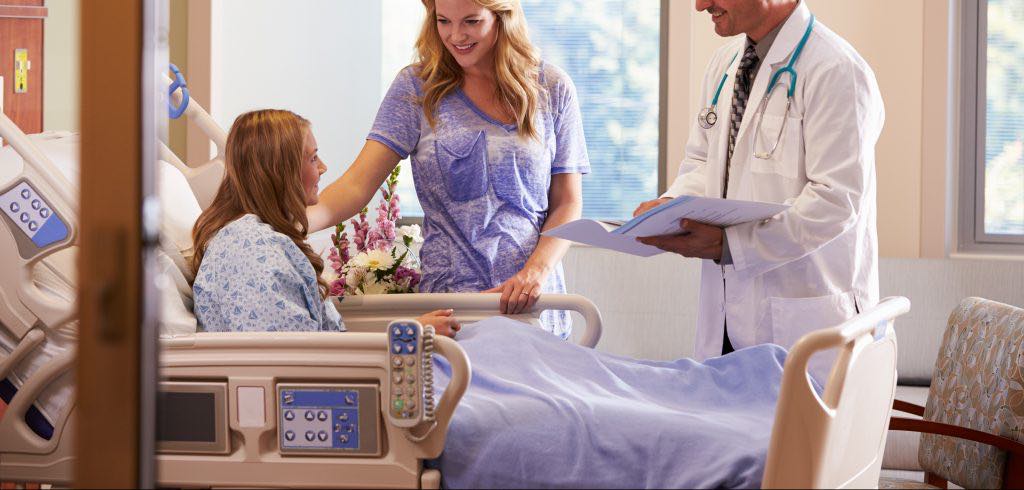If your doctor has recommended a minimally-invasive laparoscopic hysterectomy, you probably have a few questions about the procedure, especially about what to expect during and after your surgery. During a laparoscopic hysterectomy, a surgeon removes the uterus and cervix through several small incisions in the abdomen. The fallopian tubes and ovaries may or may not be removed during this surgery.
Some common reasons that your physician might recommend a hysterectomy are:
- Severe or abnormal vaginal bleeding
- Chronic pelvic pain
- Endometriosis
- Prolapsed uterus
- Uterine fibroids
- Uterine or cervical cancer
Laparoscopic hysterectomies are typically associated with shorter, less painful recovery times than traditional open hysterectomies, which are performed through a single large incision in the abdomen. Below, learn what to expect during your laparoscopic hysterectomy recovery, as well as tips to make the healing process as smooth and painless as possible.
Laparoscopic hysterectomy recovery: prepare for success
One of the most important things that you can do before your hysterectomy is to find a skilled and experienced surgeon. Laparoscopic hysterectomies are complicated and the right surgeon can increase your chances for a smooth recovery. When choosing a surgeon, don’t be afraid to ask questions. You should be confident in your decision. Some things to ask a potential surgeon include:
- How many laparoscopic surgeries have you performed?
- How many times have you had to convert a laparoscopic surgery to an open surgery?
- Why am I a good candidate for laparoscopic surgery?
Additionally, you will need to ask someone to take you home after your surgery, as you will be unable to drive. You may also need someone to help you with household chores for the first few days to a week after your surgery.
Laparoscopic hysterectomy recovery: surgery day
Laparoscopic hysterectomies may be outpatient, meaning that you’ll go home the same day as the procedure. However, some patients may stay in the hospital for one to two days after their surgery, depending on their overall health and doctor’s recommendations.
You will be under regional or general anesthesia for your hysterectomy procedure and will not feel pain. During your hysterectomy, a surgeon makes three to five small incisions in your abdomen. With the aid of a small camera attached to a thin tube, called a laparoscope, the surgeon removes the uterus and cervix through these incisions. They can then be closed with surgical tape or a minimal amount of stitches.
After your surgery, you will stay at the healthcare facility until your anesthesia wears off and you are able to eat and drink on your own. You will need someone to drive you home after your procedure.
Laparoscopic hysterectomy recovery: 1 to 2 weeks after surgery
After your surgery, you will need plenty of rest and fluids. Your doctor will recommend that you start walking as soon as possible after surgery. You should take short walks every day, increasing the distance that you walk as your body heals. This will promote healing and help prevent post-surgery complications such as deep vein thrombosis, or blood clots in a deep vein. Walking, staying hydrated, and eating a high-fiber diet can help prevent painful post-surgery constipation.
The first couple of weeks after your surgery will be the most difficult. Your doctor will prescribe pain medication to help make the healing process more comfortable. You may start adding your normal activities as you feel up to it, but you should immediately stop any action that causes pain. Avoid any strenuous exercise, such as sit-ups or jogging, or lifting anything heavier than 10 lbs. until your doctor tells you it’s okay.
Your physician will give you specific instructions on showering after your surgery.
Some people may begin driving as soon as two to three days after their surgery, depending on their doctor’s recommendations. If you are taking pain medication, you might need to avoid driving for longer.
After two weeks, many patients are able to stop taking their pain medication and return to work. However, if your job requires physical activity you may need to wait longer before going back.
Laparoscopic hysterectomy recovery: 3 to 6 weeks after surgery
It may take as long as four to six weeks for your energy levels to return to normal. After recovery, you should regularly see your gynecologist and primary physician for regular health care. You may or may not need cervical cancer screening and pelvic exams, depending on the type of hysterectomy that you had.
Your doctor will recommend that you avoid putting anything in your vagina for at least six to eight weeks after your surgery, including having sex and using tampons. After your doctor says it’s okay, you may resume sexual activity. For many patients, sexual function will return to pre-surgery levels. Some patients may experience increased sexual function if their hysterectomy was scheduled to treat chronic pain or heavy bleeding.
If you are premenopausal before your hysterectomy, and you had your ovaries removed in addition to your uterus and cervix, you may experience hormonal side effects following your procedure. These side effects are symptoms of menopause and include fatigue, lethargy, hot flashes, and mood fluctuations. Your doctor may be able to prescribe hormone replacement therapy to mitigate these effects.
Call your doctor if:
- You have a fever.
- Your incisions show signs of infection.
- You are having trouble breathing, drinking, eating, or going to the bathroom.
- You have abnormal vaginal discharge or bleeding.
- You are nauseous or have a cough that won’t go away.
Emotional recovery from a hysterectomy
For some women, choosing to have a hysterectomy can be a difficult decision. A hysterectomy can drastically improve the quality of life in women suffering from anemia, fatigue, and pain due to issues with their reproductive health. However, the procedure means that you will no longer be able to bear children. It is normal to feel conflicting emotions about this surgery. Do not hesitate to reach out to your doctor for recommendations on coping with these emotions.
Laparoscopic hysterectomy recovery: paying for your surgery
Laparoscopic hysterectomies tend to cost more than traditional abdominal hysterectomies because they require special equipment and an experienced surgeon. However, if you would prefer to have a laparoscopic hysterectomy, don’t let the high price tag deter you. New Choice Health’s hysterectomy and gynecology surgery assistance program can help uninsured and underinsured patients find an affordable price for laparoscopic hysterectomies. The national average cost for a hysterectomy is $22,750, but Patient Assist members pay an average of $9,250. Learn more about New Choice Health’s Patient Assist program to save money on your hysterectomy today.







